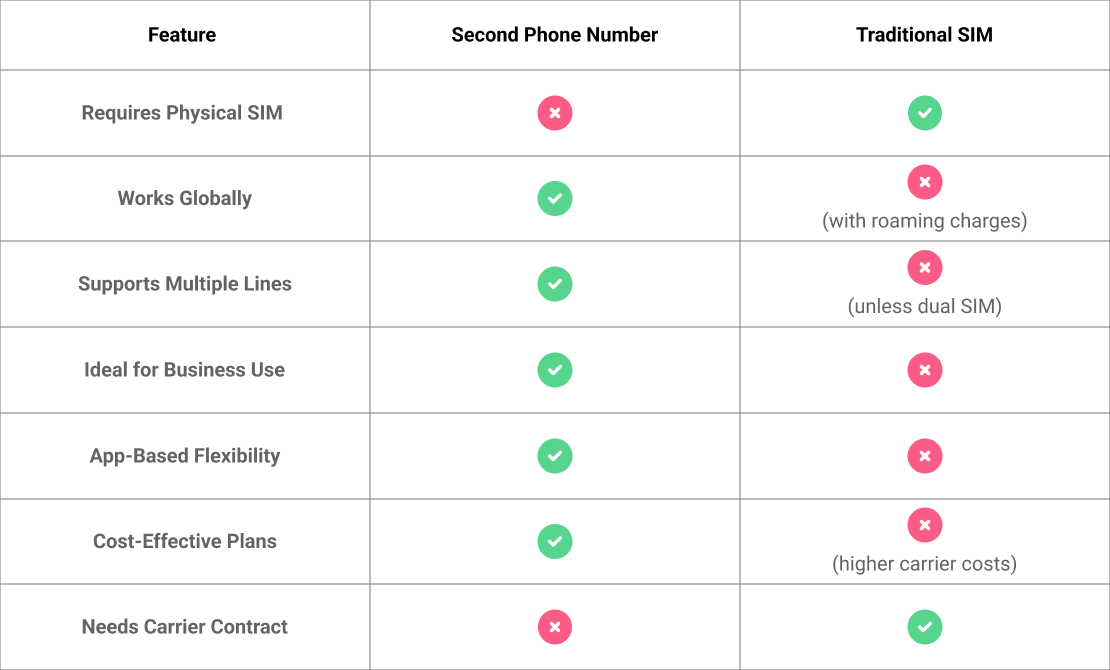
Your phone number is more than simply a way to contact or text someone in today’s world, which is always linked. It’s also a key tool for communication, safety, business, and getting things done. But the way we utilize phone numbers changes as technology changes. One of the major changes we’re seeing is the movement from regular SIM cards to virtual ones, like Second Phone Number.
You’ve come to the right place if you’re not sure whether to keep your regular SIM card or move to a second phone number app like Second Phone Number. This blog will tell you everything you need to know to make the best choice for your personal or business needs.
What Is a Traditional SIM Card?
A SIM card is a little chip that goes into your phone. It stands for Subscriber Identity Module. It connects your smartphone to a mobile network, which lets you make calls, send texts, and use data while you’re on the go.
- Requires physical insertion into the device
- Tied to a single mobile carrier (unless unlocked)
- Offers voice, SMS, and data services
- Needs a new SIM for every number
- Typically requires manual activation or a store visit
What Is Second Phone Number?
Second Phone Number is a virtual phone number program that lets users add another number to their current phone without needing a second SIM card or phone. Second Phone Number is a flexible, reliable, and cheap alternative for business owners, remote workers, freelancers, or anybody who wants to keep their professional and personal lives separate.
- App-based second phone number
- No need for extra hardware or SIM cards
- Works with Wi-Fi or mobile data
- You may phone, text, and leave a voicemail.
- Supports business features like call forwarding, auto-reply, and voicemail-to-text
Second Phone Number vs Traditional SIM: Feature Comparison
1. Ease of Setup
- Traditional SIM: You need to buy a real SIM card, put it in your phone, turn it on, and set up APNs in some cases. It’s a little annoying, especially if you’re switching providers or going on a trip.
- Second Phone Number: Set up 100% digitally. You may start calling and messaging right away after you download the app, sign up, and choose a number.
2. Flexibility and Portability
- Traditional SIM: Bound to a specific carrier and sometimes to a specific country. Roaming charges can be high when traveling.
- Second Phone Number: Works globally over Wi-Fi or mobile data. Great for travelers, remote teams, or digital nomads.
3. Cost-Effectiveness
- Traditional SIM: Requires a mobile plan that often includes extra fees, taxes, and charges. International calls and roaming can be expensive.
- Second Phone Number: Offers affordable plans with no hidden fees. International calling is often cheaper via VoIP.
4. Device Compatibility
- Traditional SIM: Not compatible with SIM-less devices like some tablets or modern wearables. Requires a SIM slot.
- Second Phone Number: Works on any smartphone (iOS/Android), tablet, or desktop via the app or browser.
5. Use Case: Personal vs Business Communication
- Traditional SIM: Ideal for personal use but can be limiting for business. Mixing work and personal calls can be confusing and unprofessional.
- Second Phone Number: Tailored for business or freelance use. Helps keep communication organized and professional with business tools like autoreplies, voicemail greetings, and call routing.
6. Security & Privacy
- Traditional SIM: Your number is tied to your personal identity and can be vulnerable to SIM swap fraud.
- Second Phone Number: Separating your company number from your personal number adds an extra layer of privacy. You may quickly turn off, erase, or change numbers without affecting your main line.
7. Multiple Numbers
- Traditional SIM: Limited to one number per SIM card. To use another number, you need a dual SIM phone or switch SIMs.
- Second Phone Number: You can manage multiple numbers from one app, all on the same device.
Why Second Phone Number Makes Sense in 2025
Seamless Work-Life Balance
Remote-First Friendly
No Contracts, No Commitments
Enhanced Productivity
Who Should Choose Second Phone Number?
- Freelancers who want to keep business communication separate
- Small business owners managing client calls from one device
- Remote teams needing a local presence in multiple countries
- Real estate agents, consultants, and gig workers who rely on flexible communication tools
- Anyone who travels and wants to avoid roaming charges
Who Should Stick with a Traditional SIM?
- Want a number that works offline or in areas with weak internet
- Prefer using your carrier’s voice/data services
- Don’t need a second number or business features
